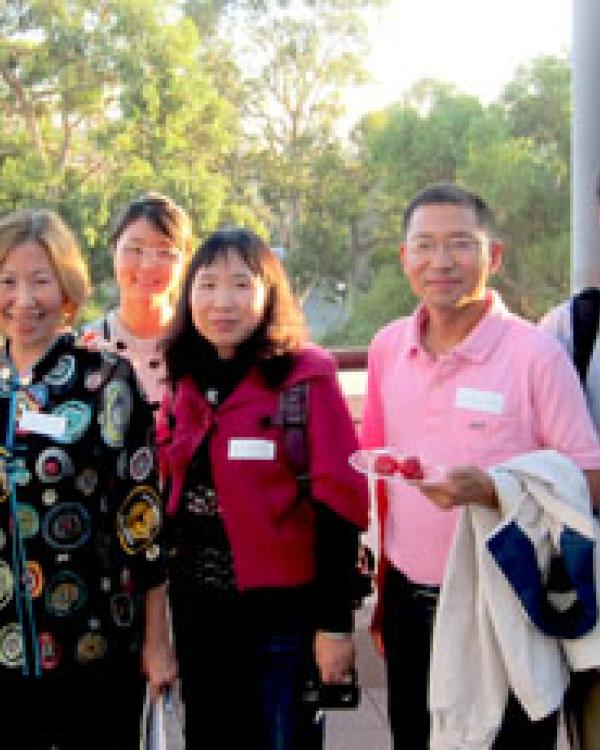
Andres Consoli, Melissa Morgan Consoli, Hsiu-Zu Ho and international scholars at an event at the Gevirtz School
As one part of its celebration of International Education Week last fall, the Gevirtz Graduate School of Education hosted a reception for the School’s visiting scholars, international students, faculty, and campus and community friends. At that event, faculty members gave brief presentations of the work they have been doing around the globe.
The internationalization in Gevirtz School faculty research has reached over 88 countries across all seven continents. Several faculty members spoke at the event, highlighting a few of their international projects:
(1) As one of the editors of the recently published Handbook on International School Psychology, Dr. Shane Jimerson has been instrumental in leading the International Institute of School Psychology, promoting collaborative scholarship and teaching on issues of school psychology;
(2) Dr. Betsy Brenner has been working with teachers to develop mathematics curriculum based upon the local culture in nine different islands in Micronesia and Polynesia under the NSF-funded MACIMISE project organized through the University of Hawaii and the Pacific Resources for Education and Learning;
(3) Dr. Tine Sloan has initiated a reciprocal exchange program for student teachers from UCSB’s Teacher Education Program (TEP) to participate in teaching experiences in Denmark, Singapore, and Switzerland; and teacher candidates from those countries come to UCSB to participate in teaching experiences in local school districts. Dean Jane Close Conoley of the Gevirtz School points to this international student teacher exchange program as having “wide-reaching benefits both locally (for our own TEP program as well as local school districts) and globally.”
Some of the international activities by other faculty attendees include:
Dr. Andrés Consoli (past president of the Interamerican Society of Psychology) and Dr. Melissa Morgan Consoli have been instrumental in advancing professional psychology training and research in several Latin American countries; Dr. Jenny Cook-Gumperz has recently explored issues of the media and language standards in multicultural Europe as well as the pragmatics of globalization-workplace communication in a lingua franca; Dr. Michael Furlong is working with researchers in eleven sites across the globe on the translation and cross-validation of UCSB-developed psychological measures related to students’ anger-related experiences, bullying, school climate and safety, and social-emotional wellbeing; Dr. Judith Green collaborates with Brazilian researchers on the topics of inclusive practices, identities in the face of fluid modernity, and ways of studying discursive construction of learning; Dr. Hsiu-Zu Ho examines aspects of father involvement in the everyday lives and education of young students in Taiwan; Dr. Peggy Lubchenco participated in a two NSF-funded scientific research projects in Antarctica: one on the physiology of Antarctic toothfish and a second on the effect of ocean acidification on marine invertebrates in polar regions; Dr. Russ Rumberger is engaged in The International Study of City Youth in at least twelve global sites that compares how well school systems in major cities of different industrialized countries are preparing young people for college and careers; and Drs. Mian Wang and Michael Gerber lead the Pacific Rim Center for Research on Special Education and Disability (comprised of 20 countries) whose aim is to enhance the international exchange of empirically-based knowledge that can support education of children and youth with disabilities.